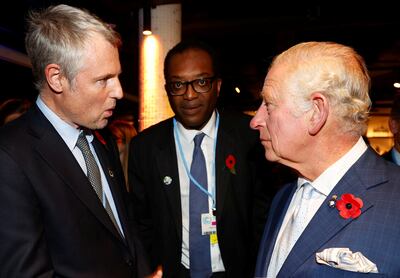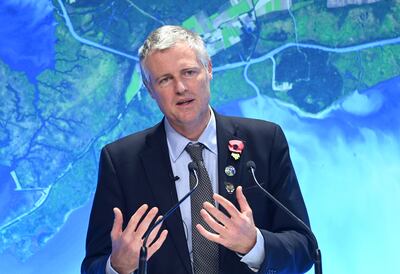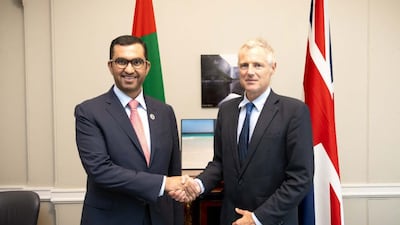Veteran campaigner Zac Goldsmith sees reasons for optimism that countries will deliver on their spending promises at Cop28, four months after leaving the UK government with a withering attack on a prime minister “uninterested” in the environment.
The 48-year-old quit his job in Rishi Sunak's government in June but will be a keen participant in the Cop28 meeting in Dubai in November and December.
Mr Goldsmith joined the UK government as environment minister as it hosted the Cop26 climate summit in 2019 and said Cop28 is well placed to offer an opportunity for a reboot.
Quitting government gave him greater scope, he said, to ensure nature is at the heart of global efforts to keep global warming on track.
“My concern more recently was that we were losing that momentum,” he told The National. “The ground changing thing that emerged from Cop26 was that we brought nature in from the periphery, from the margins.
“There's no pathway to net zero that doesn't involve massive efforts to protect and restore nature and that was reflected in [Egypt's] Cop27 and it will undoubtedly be reflected in Cop28 as well – [Dr Sultan Al Jaber, Cop28 President-designate] and the team have really made that very clear.”
In another time, not one marked by the climate emergency, Mr Goldsmith's intense dedication to the natural world would be seen as iconoclastic and a personal obsession, not trailblazing campaigning.
The Old Etonian often seems more at home in rainforest glades than the red benches of the UK House of Lords, where he remains a legislator.
Mr Goldsmith's primary concern revolves around promoting and extending commitments on forests and mangroves, issues that he sees as “high up the agenda” for the forthcoming UAE meeting.
His mantra in his work is not only stopping damage to nature but to “shift it to renewal”. That means not only working with countries where the issues are most stark but with finance, philanthropy and business to mobilise funding and remove “perverse incentives” for planetary destruction.
“My focus now that I'm freed from ministerial responsibilities is to make good those promises of Cop – so far the UAE Presidency have been fantastically helpful,” he said.
“We have big, big moments at the start of Cop28 where leaders are going to be given an opportunity to report back not just to country leaders but the private sector, philanthropy and so on.
“From what I've seen so far, it looks like we are nearly on track with the spending commitments that were made by different donor countries. I think in terms of promises being made and kept, the story is better than I think I and others had expected it to be.”

For Mr Goldsmith, the countries in the “better-than-expected” category could well include the UK, despite his resignation warning that the country would lose leadership prestige if it went off track.
In the months since, Mr Sunak rolled back commitments within the UK's Net Zero by 2050 plan on deadlines for installing gas boilers in homes and banning new combustion engine cars.
The final straw for Mr Goldsmith was backsliding on a target of £11.6 billion the UK had pledged for climate and nature funding made in 2019. Mr Goldsmith had a hand in the “earthmoving commitments” behind the 2019 Forests Declaration and says resources pledged to nature-based solutions to climate are a litmus test for action.
He hopes the world will be on track for an end to deforestation by the end of this decade.
In government, he thought the target was being lost, particularly as a result of a lack of direction from Mr Sunak, but he has since detected something of a change of heart, with new commitments from his old colleagues.

“I hope I'm not putting too optimistic a spin on it, but it feels to me that on the finances, money side of things, we are gradually moving back into the position where we belong, which is making promises and keeping them,” he said.
The climate and nature pledge makes the three big regions of concern – the Congo Basin, the Amazon and Indonesian rainforests – a top priority.
“If we lose any one of these huge biomes, it's game over in terms of climate change,” he observed.
The Congo Basin provides much of Africa's rainfall and a key part of saving it is the Great Green Wall project across the Sahel. As a result of it, and even the wider push on issues like restoring mangroves in the Arab world, he says Saudi Arabia wants to influence this work, which he celebrates.
“The beauty of mangroves is obviously great in terms of mitigation and when as they grow they also provide coastal protection so are an adaptation partner,” he said. “They provide jobs as it's quite labour intensive to repair and protect them. And mangroves are where a lot of the deep sea fish can thrive.
“The UAE has given us some great champions on this. The President and supporting him is two great high level champions. Razan Mubarak really understands very deeply this inextricable link between climate and nature, she gets that fully and really is a great ambassador.
“You've got Mariam Al Mheiri [UAE Minister of Climate Change and Environment], she, too, is a great champion when it comes to things like mangroves and nature restoration.
“I'm pretty optimistic when it comes to this part of the agenda.”


